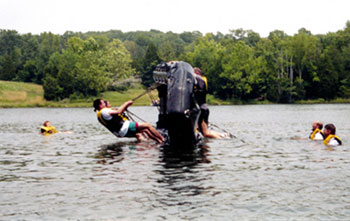Seeing How Army Leaders Are Made

Tina DeAses (back left) and other staff members
from across the country participate in a capsizing exercise during
the Leadership Training Course at Fort
Knox, which was held June 24-28.
Every summer the department of military science sends SHSU faculty and staff
members to visit ROTC training courses across the country “in order
to promote an understanding and appreciation of the leadership development
process used to transform
Army ROTC cadets into future Army leaders,” according to Capt. Christopher
Wooten.
That mission was accomplished this summer when two members of the Recreational
Sports family, wellness director Tina DeAses and associate director of outdoor
recreation Marvin Seale, made the trips to the Leadership Training Course and
the National Advanced Leadership Camp, respectively.
DeAses spent June 24-28 at Ft. Knox observing the LTC, which counts as credit
for the first two years of ROTC.
“It provides an opportunity for those who did not participate in ROTC during
their freshman and sophomore years in college, to catch up with their
peers,” Wooten said. “Cadets who attend LTC also earn a scholarship
that pays for their last two years of school (tuition, books and fees).”
The program, geared more toward attendee participation, allowed DeAses to do
such things as rappel, canoe, participate in a ropes course, swim with a gun
over her head, and jump off a diving board blindfolded, among other things. Though “definitely
physically demanding,” she said her experience was “awesome” and
was something she learned from both professionally and personally.
“I think more than anything what was great about the experience was that
it was very motivational, like stepping up to the challenge. Whenever you are
going to rappel off a 50-foot tower, it kind of gives you butterflies, and it
gets you all excited, but at the same time, you can’t say ‘no’;
you have to step up to the challenge and accept it and just do it,” DeAses
said.
“What was awesome professionally was just seeing the ROTC cadets as such
leaders. It was amazing seeing them; there were some vice presidents and vice
principals who were there who were at least in their 50s and were scared to death
to go down the tower,” she continued. “It was interesting seeing
these 18- and 19-year-old cadets talk them through it and be so professional
about it. It was awesome to see them, as young students still, be in that role
and be able to step up to the plate the way that they did.”
With no personal experience in the military, Seale said he considered himself
a perfect candidate to attend the National Advanced Leadership Camp, held July
12-15 at Ft. Lewis, Wash.
“I wouldn’t have been the first person if a student came up to me
looking for direction to send them over to ROTC necessarily, but having gone
to that and observed the training, I think I would be much more likely after
talking to a student to put that forward as an option,” he said.
“I think one of the most impressive things that I learned was with an all-volunteer
Army these days in the United States, they have a pretty elite group already.
So I thought there was much more emphasis on developing versus
excluding,” Seale said. “I thought it was, for lack of a better term,
a kind of kinder, gentler Army than the stereotype that I had had in my head,
and
that’s another reason why I would be more prone to talk to a student or
turn a student towards our ROTC if they’re looking for career opportunities
or direction.”
The NALC is a requirement for those cadets who want to pursue a commission in
the United States Army, according to Wooten.
Seale, too, had the opportunity to participate in some of the cadet activities.
“This particular one saw a lot more upper administration folks and maybe
an older crowd of educators, but we were given opportunities. I, for example,
shot an M-16 on the range. That was fun; it was exciting. That was pretty much
the extent of doing what the cadets were actually doing. Opportunities were given
for doing the rappelling and the slide of life.”
Both DeAses and Seale said they enjoyed their experiences and wouldn’t
hesitate to take the opportunity to go again if they had a chance.
“I think that educators on this campus, if they are at all interested not
only in going to Ft. Louis, or Ft. Knox, as Tina did, to go and talk to the Army
officers here that are running our ROTC program and look for
those opportunities,” Seale said. “They are very good at picking
up the cost and being very accommodating in an effort to get you there to let
you see just what our students are doing in the summer and the extra load that
these
ROTC students are willing to carry.”
- END -
SHSU Media Contact: Jennifer Gauntt
Sept. 9, 2003
Please send comments, corrections, news tips to Today@Sam.edu
|


